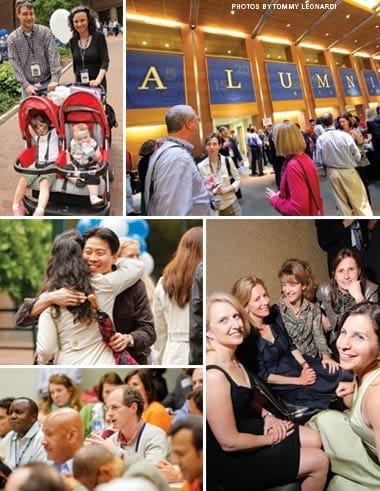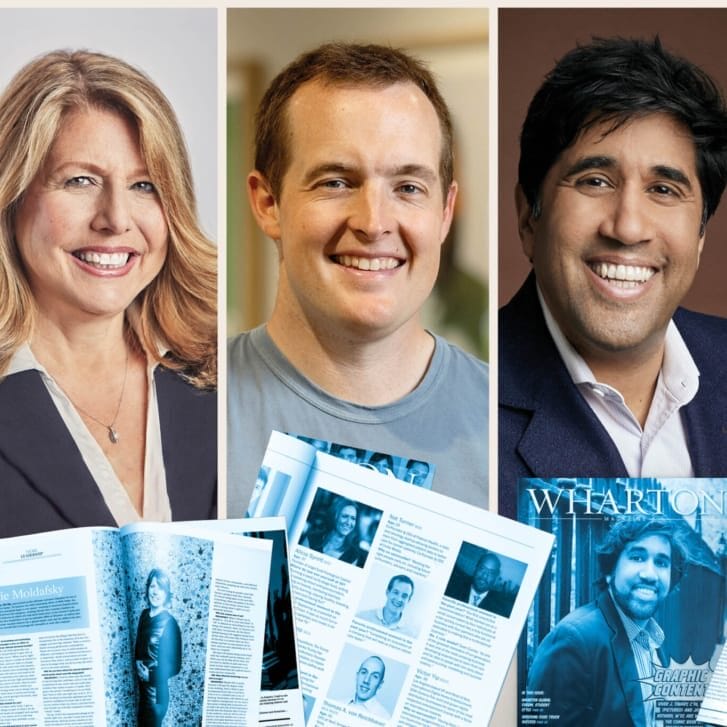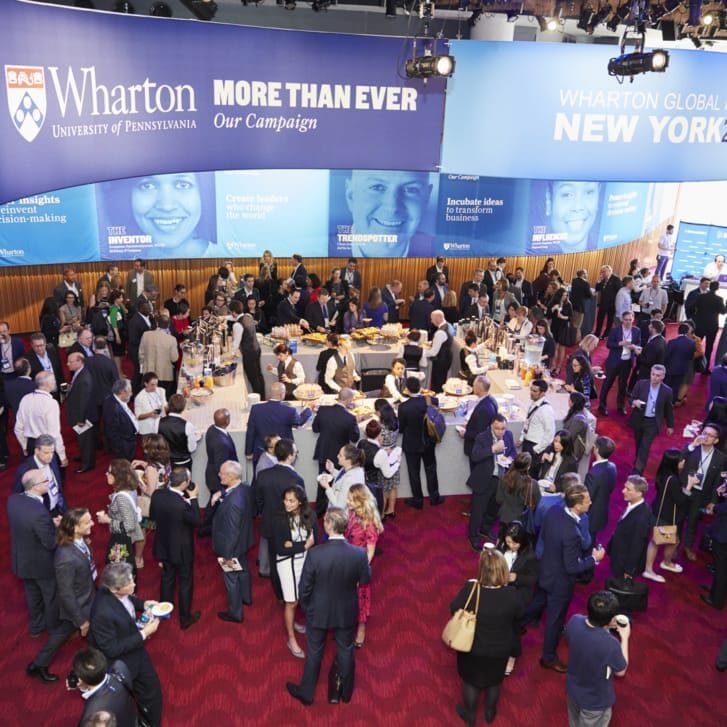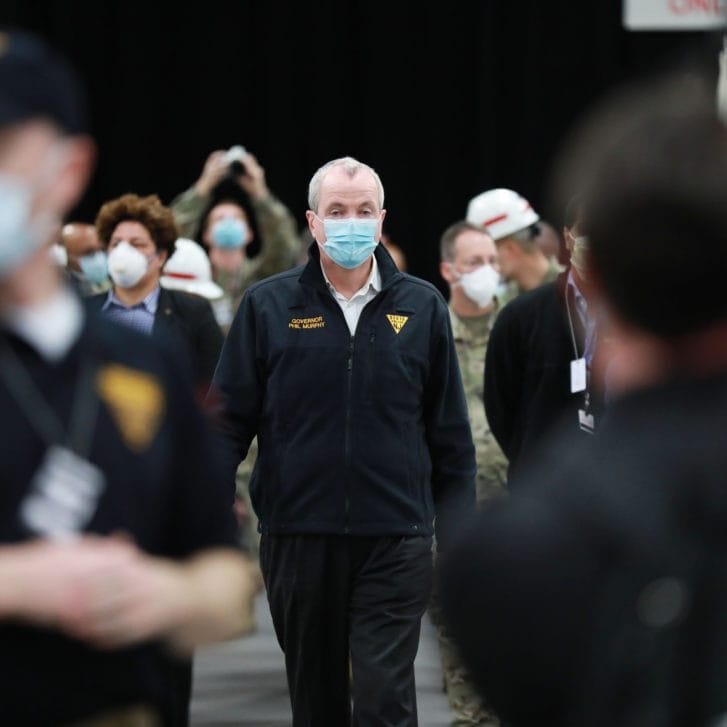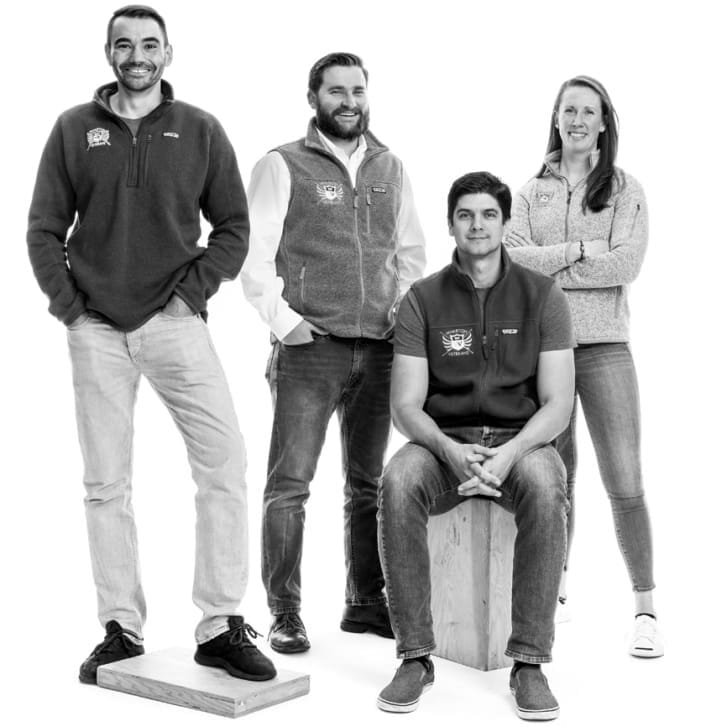More than 1,300 alumni came for events that kicked off on Friday, May 16 with professional education workshops led by Wharton professors and alumni and ended on Sunday, May 18 with an All-Alumni Brunch and the traditional alumni processional during graduation to welcome new degree-holders to the alumni fold.
Wharton professors including Michael Useem, Richard Shell, Jeremy Siegel, and Monica McGrath led talks on the latest topics affecting business, while Dean Thomas S. Robertson reported on his vision for the School’s future at a Wharton Town Meeting in the Dhirubhai Ambani Auditorium of Jon M. Huntsman Hall.
At “The Entrepreneurship Perspective — Lessons from Wharton Alumni,” one of three Friday afternoon professional education workshops, Wharton alumni Jay Minkoff, WG’83, president and CEO of marketing firm First Flavor of Bala Cynwyd, PA; and Selwyn Isakow, WG’78, founder and CEO of Bloomfield Hills, MI-based Oxford Investment Group, discussed the motivations, challenges, and rewards of owning a business.
“Your business will never play out like it does in your business plan,” Minkoff told attendees. “You have to have flexibility in your structure — your money, your timeframe, your markets. You need to plan for bad things happening — stuff will cost more than you thought, key people will leave, and markets will evaporate.”
Friday evening, alumni mixed business with pleasure at the MBA pub for the Class of 2003, a Class of 1998 kickoff reception on the 8th floor of Jon M. Huntsman Hall, and an All-Alumni Reunion Class Mixer at Rae Restaurant at University City’s Cira Centre, the first major high-rise office building in Philadelphia to be constructed outside of Center City.
The skies cleared on Saturday in time for alumni to reconnect with friends in the Lehman Brothers Quad for the traditional family picnic — an event many chose to introduce new family members to the Wharton community. Jared Mintz, WG’93, reported that he and his wife were busy “showing our twin nine-month-old daughters around their future campus.” The seasonable afternoon gave reunion attendees and their families the chance to enjoy a schedule of family and cultural activities that offered something for everyone, from a family trip to the Academy of Natural Sciences to a trolley tour, and the 30th annual alumni run/walk. “At reunion I was inspired to continue learning and connecting,” said Juliana Bloembergen Dalton, WG’83.
Later in the day, Lauder alumni gathered at a reception at the Lauder Lounge, and the MBA reunion classes took over the ballrooms of the Loews Philadelphia and Sofitel hotels.
Next year’s Reunion promises a lively mix of professional programming, networking opportunities, and social engagement. Mark your calendars for May 15-17, 2009.
Five alumni from reunion classes spanning 10 to 50 years share perspectives on their careers.
Working to Refocus Japanese Higher Education
YOTARO KOBAYASHI, WG’58
“If you don’t have a good liberal arts education,” says Yotaro Kobayashi, “adding professional training on top of that will only produce robot-like minds — very mechanical and very effective at doing narrow-minded things, but not at seeing or understanding broadly defined issues.”
After a lifetime of business success, Kobayashi, who recently returned to Wharton for his 50th reunion, has education foremost on his mind — specifically, how he believes Japanese higher education has fallen behind.
“Education as a whole is my central point of interest,” says the former chairman and CEO of Fuji Xerox Co. “Here in the U.S., I am envious that most of the first-rate universities, including Penn, give a first-rate undergraduate liberal arts education.”
Two years ago, Kobayashi, a Tokyo native, stepped down as chairman at Fuji Xerox and now serves as chief corporate advisor for the company. Fuji Xerox, a joint venture between Xerox Ltd. and Fuji Photo Film Co., Ltd., has nearly $10 billion in revenues and more than 40,295 employees.
Kobayashi has been integral to the company’s success. He joined the Fuji Photo Film Company the year he graduated from Wharton, and five years later was assigned to the parent company, where over time he ascended to join the board of directors (1968) and become executive vice president (1976), president and CEO (1978), and chairman of the board (1992).
He’s now most concerned about educating the next generation of leaders.
“In higher education at the college level [in Japan], in particular after 1945, humanities education has been deemphasized, with more emphasis on management, economics, and focusing on the how-to rather than the what and the how,” he says. “Until the end of the ’70s, that was extremely successful, because we knew what the problems were. But starting in the mid-’80s, it was not just the known problems that we were facing. We had to define what the problems were for Japan, for Asia, for the world.
Kobayashi’s leadership beyond business includes positions on the board of the Aspen Institute, the advisory board of the Council on Foreign Relations, and the board of his Japanese alma mater, Keio University, and being chair of the Pacific Asia branch of the Trilateral Commission, as well as myriad other organizations. He’s also a member of Wharton’s Executive Board for Asia and a former Penn trustee.
It’s with this very up-close view of formal education that Kobayashi believes liberal arts instruction in Japan needs to be restructured.
“I was telling my classmates at lunch today about my learning at Wharton,” he says. “I had forgotten all the specific teachings of the different classes, but two things have continued to stand out: One is the Wharton steps of defining problems — you really have to define your problems correctly at the first stage.”
And the other?
“The importance of communications — particularly coming from Japan,” he says. “The essence of the lesson was that communication is really to let the other party understand you better.”
– Jeffrey Barg
Slow and Steady Wins the Race
ROBERT JAUNICH II, WG’63
Bob Jaunich has patience, and lots of it. It even comes out in the way he speaks — measured and deliberate — and it’s what drives his investment philosophy.
“We’re looking at companies in a much more granular fashion than others might,” says Jaunich, founding partner of the San Francisco- and Boston-based Calera Capital private investment partnership. The group is known for remaining invested in companies for six, seven, even eight years, which Jaunich says, is “very atypical for private-equity firms.”
Jaunich founded the 35-employee company in 1991, and Calera has invested $2 billion in industries including financial services, business services, food and consumer, healthcare, building products, and industrial manufacturing.
“Through the years I’ve tried to identify companies that look like they’re real companies and have good revenue histories, good profit histories, good cash flows, good management, and good culture, but for one reason or another are seeking private equity,” he says. “Our resonance with the people we talk to is that we come at all these situations with an operating perspective, not a purely financial perspective.”
That operating perspective is one Jaunich knows well. The first 23 years of his career, from his Wharton graduation until he left corporate work in 1987, he spent working in operations. Those more than two decades included six years at Procter & Gamble, as well as serving as executive vice president of Memorex Corporation, president of Sara Lee Corporation, president of Osborne Computer Corporation, and executive vice president and member of the chief executive office of Jacobs Suchard AG, a Swiss-based world leader in chocolate, sugar confectionery, and coffee.
When he started Calera Capital in 1991, Jaunich says, “that combination of operating experience plus investing experience was a fairly rare combination for private equity.”
Jaunich seeks out companies in which Calera can make a majority investment. But that financial commitment — typically in companies with enterprise values up to $1 billion — is reflective of the long-term relationship Jaunich sees in each situation.
One example is Calera’s investment in Kerr Group plastics, a deal in which Jaunich teamed up with old friend and Wharton classmate Richard D. Hofmann, WG’64, the former president of Continental Can Co.
After acquiring the outstanding shares of the NYSE-listed Kerr in August 1997, they acquired Sun Coast Industries, Inc., a manufacturer of specialty plastic closures, the following spring. “And then we finally bought all the packaging from McCormick, the spice people, and so we ended up with a very nice-sized company,” he says. “Over several years of building this, we exited by selling it to a strategic player,” Berry Plastics Corporation in June 2005 — almost seven years after first investing.
Jaunich brings his operations experience to the nonprofit world as well. He serves as president and trustee of the National Recreation Foundation, which promotes healthy lifestyles for at-risk youth; serves on the board of trustees of the Palo Alto Medical Foundation; and is heavily involved in the Boys & Girls Clubs of the Peninsula, serving on the president’s advisory council in East Palo Alto, Menlo Park, and Redwood City, CA.
“I’ve always enjoyed challenge, and in all these organizations, there’s a huge challenge.”
– Jeffrey Barg
Paying Attention to the Personal Side of Business
ROBERT J. HURST, WG’68
For Robert Hurst, the line between professional roles, charitable work, and social life is a blurry one: “It’s all one and the same,” he says. “It’s all about relationships.”
Hurst, now a partner of the private equity firm Crestview Partners, believes strongly that relationships are built anywhere.
Indeed, two former colleagues brought Hurst to Crestview in 2005. Founding partners Barry Volpert and Tom Murphy had both been partners at Goldman Sachs, where Hurst spent 30 years. And relationships built Crestview’s first fund, which, fully invested, was just less than $1.5 billion.
“Of the 10 direct investments we made in portfolio one, not a single one came about because of a classic auction,” says Hurst. “Every one came because of relationships.”
Crestview, which operates in the mid-sized market, is now in the midst of launching a second fund, which Hurst says “will probably be around $2.5 billion — maybe more.”
Hurst’s relationship building has found equal significance in the arts and nonprofit worlds. For the last five years he’s served as president of the board of the Whitney Museum of American Art, and he’s a member of the Board of Overseers of Wharton.
Before joining Crestview, Hurst spent 30 years at Goldman Sachs, where he retired as vice chairman in 2004. Over the years he held a variety of leadership positions, including heading investment banking from 1990 to 1999.
He got his start early, beginning Wharton’s MBA program at age 20 after receiving his undergraduate degree from Clark University. Following a five-year stint at Merrill Lynch, Hurst moved to what was a much smaller Goldman Sachs, then a company of about 1,000 employees.
His attention to the personal side of business also started early. When Hurst became a partner in 1980, he was given a list of 200 mid-Atlantic companies that were either new to Goldman Sachs, or had had a negative business experience with the firm.
“I did it the old-fashioned way,” he says, “calling, being thoughtful, suggesting good ideas. But it was always based on not wasting someone’s time and trying to put myself in the shoes of the person I was calling.” That kind of gumshoe legwork paid off. “Within a relatively short period of time we had a major market share in the mid-Atlantic area that I was asked to cover.”
In addition to his role with the Whitney, Hurst is chairman emeritus of the Jewish Museum in New York, a trustee of the Aspen Institute, a member of the Council on Foreign Relations, and the founding CEO of the 9/11 United Services Group, the coordinating arm for 13 social services agencies involved in relief activities, including the Red Cross.
Again, says Hurst, it’s the personal connections that have emerged that make any work he has engaged in, be it running a major private equity operation or donating his time to Wharton, the Whitney or the Jewish Museum, most satisfying. “It’s really all about helping,” he says.
– Jeffrey Barg
Stocking Every Refrigerator in Chile
CLAUDIO ENGEL, WG’83
There are about a million things you can do to call your operation a “family business.” Claudio Engel can check off pretty much all of them.
The obvious ones are easy: business started by family members and passed down through the generations, naming companies after family members, kids working in the mail room while they’re growing up.
But in a country like Chile — and for a businessman like Engel, whose training at the Universidad de Chile was as a civil engineer — “family” carries more than the standard definition. It’s about knowing the personal lives of your employees, and feeling invested in the life of the country.
“Our country has 16.5 million people, and our whole economy is equivalent to something like Boston’s or Philadelphia’s,” Engel says on the phone from his office in Santiago, Chile. “We’re in every home. Every refrigerator has our products. Most of the food in the refrigerator has our raw materials.”
The privately owned F.H. Engel group of companies, for which Claudio Engel works as executive vice president and CEO, reaches into myriad facets of Chilean life and beyond. The Engel family first emigrated to Chile from Hamburg, Germany, to sell canaries. Today, F.H. Engel has spread its wings around four companies: one dedicated to representing multinationals in the Chilean market, one that supplies finished goods to supermarkets, a leading company in temperature control logistics, and a retail discount store called Erbi.
Even the company names are all in the family: The first two are named for Claudio’s father, Frank Herbert Engel; the third is called Luniben, for Claudio’s three sons, Lucas, Nicolas, and Benjamin; and Erbi was the nickname that arose from Chileans who couldn’t pronounce the name “Herbert.” (Engel jokes that he still needs to create a firm to name after his daughter, Francisca.)
Over the years, Engel, a member of the first Wharton Fellows class in 1991, has continued his strong ties to the School. He has served on the Wharton Latin America Board since its inception, and when the Wharton Global Alumni Forum came to Santiago, Chile, for the first time in 2005, Engel worked as chairman of the organizing committee.
In 1985, two years after graduating from Wharton, Engel got roped into the family business the way you’d expect: through his father.
“I was working as market support manager for Latin America at a company called Raychem in Menlo Park, California,” he says. “My father called me one day and said, ‘It’s time to get down here. You’re going to make less money, but it’s going to be yours.’”
That family business mentality continues today.
“When you run a family business and you have 300 people, you consider that you have 1,200 people,” Engel says. “Each person has a family, and you have a lot of responsibility.”
“I have three employees celebrating 30 years in the company this year, two who have been here 25 years, four or five at 20 years,” he says. “That’s a lot. You don’t see that much anymore.”
For the Engel family, the notion of family business extends beyond the company itself. In March 2004, the family opened the Engel Foundation, where 10 psychologists and three psychiatrists give group psychotherapy to low-income people. Engel’s wife, a psychologist, serves as director.
“My parents always wanted to thank Chile for what it did for them, because they were running from the war, and they were both very successful,” he says.
What’s more, the foundation got off the ground in time for Engel’s father, who passed away in late 2005, to see his dream realized. “For Latin America, there’s so much to do,” Engel says. “We consider ourselves part of that growth. My reward is to see that the results are good.”
– Jeffrey Barg
Building a Powerhouse
LISA PICKRUM, WG’98
Lisa Pickrum is bigger than Oprah.
Well, maybe not in terms of fame, global influence, TV screen time, or tendency to rub elbows with world leaders.
But when Black Enterprise magazine compiled its list of the top 50 women in business in 2006, Pickrum and Oprah were on the same page. And Pickrum’s photo dwarfed that of the international TV mogul.
“People were sending me e-mails saying, ‘I can’t believe your picture was bigger than Oprah’s!’” Pickrum laughs.
And the showbiz connection isn’t such a stretch. As executive vice president and chief operating officer of RLJ Companies, started by Black Entertainment Television (BET) founder and billionaire Robert L. Johnson, Pickrum has a hand in holdings from real estate to professional sports, gaming, film production, and financial services.
“She’s one of the right-hand executives Bob Johnson counts on to move his empire forward,” wrote Black Enterprise of Pickrum in its “Hot List” cover story last December. The magazine also cited her key roles in forging “a number of lucrative partnerships,” including the creation of a private equity fund with The Carlyle Group and a joint venture with Deutsche Bank Asset Management.
Indeed, Pickrum’s involvement in Johnson’s holdings varies widely. With a younger company such as RLJ’s Los Angeles film company Our Stories Films, she’s more hands-on.
She emphasizes, though, that her job is often simply giving an RLJ company executive what he or she needs to best lead, though she recently finished an assignment as interim CEO of RolloverSystems, a company that sells technology and services to retirement plan administrators.
The rest of her time is spent structuring new joint ventures and acquisitions, a practice informed as much by her legal background as her business acumen. After graduating from Vassar College, Pickrum first went to Stanford Law and then practiced for two years before coming to Wharton.
Though Pickrum took a break from professional life after the birth of her second child, Johnson lured her back almost five years ago with the promise of a balanced work and home life.
Now that RLJ’s portfolio has grown to 10 companies, Pickrum is working to build stable, mature businesses in each.
“Our company is very much identified with Bob Johnson,” she says. “We need all of these businesses to have their own identity so if there’s a day that Bob decides he wants to bow out — which by the way would never happen — we would all be able to run 100 percent. Whenever you have a business conglomerate that’s so identified with a person, you have to think about that.”
– Jeffrey Barg




















